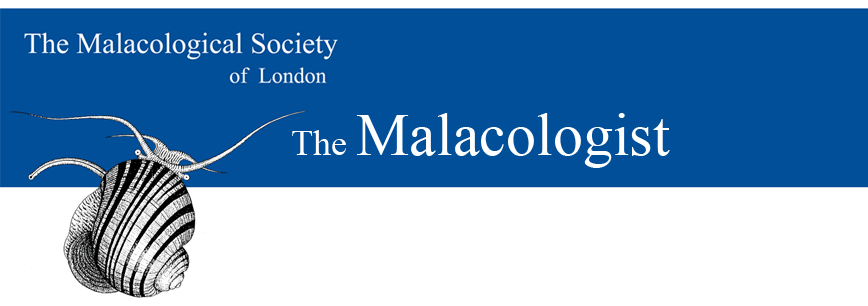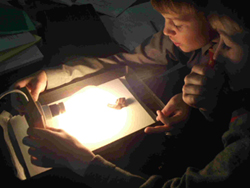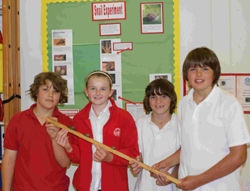

The Society aims to make the following awards annually:
Travel Awards - at least 5 each of up to £500
Research Grants - at least 5 each of up to £1000
Application forms and guidance notes for both schemes can be downloaded from The Society's website.
Travel Awards
Through the year we received two applications from researchers for Awards to Travel to meetings or to undertake research in laboratories away from the applicants' home country.
All Travel Award applications are reviewed by an Awards Committee. The Society is pleased to have made the following awards:
Katerina Douka, University of Oxford (£500) to travel to ICAZ 2008 - Archaeomalacology working group
Martine Claremont, Natural History Museum (London) (£500) to attend the Congress of the European Malacological Societies
In addition, £392 was provided to the organisers of a Meeting entitled J.Knudsen 60+ years in malacology: global imprints and foresight in taxonomy for student attendance; Andre Sartori of the University of Cambridge was the recipient of this award.
Therefore a total of £ 1,392 has been provided by The Society for Travel Awards. All applicants have been notified of the outcome.
Research Grants
By the closing date of 15th December The Society had received twenty-eight applications from workers in twelve different countries. As in previous years, the scientific quality of the research projects submitted was excellent. On behalf of The Society, I would like to formally thank the members of the Grants Review Panel for their hard work reviewing all applications. The following awards have been agreed by the Panel:Ursula Smith, Cornell University, USA £844
for
Identification of Heterochronic Mode in the New Zealand Turritellid
Genus Stiracolpus.
Marina Zieger, University of Michigan, USA £1000
for
The Functional Organisation of Retina and Optic Nerve in Gastropod
Snail Lymnaea stagnalis.
Rachel Walton, University of Manchester, UK £890
for
The Impact of Aluminium and Silicon on the Shell Strength of Lymnaea stagnalis
Francesco Pilotto, University of Inserbia of Varese,
Italy £445 for
Impacts of the Invasive Zebra Mussel on Native Unionid Bivalves
Steven Brady, Yale University, USA £1000 for
Urbanisation and rapid evolution of the Marsh Pond Snail (Stagnicola elodes)
Stephanie Aktipis, Harvard University, USA £988
for
Phylogenetic Patterns of Evolution and Diversification of the
Archaeogastropoda
Janine Arruda, Pontificia Universi dade Catolica
do Rio Grande do Sul £968 for
Cladistic Analysis of Omalonyx d' Orbigny
Juan Cueto, University of Cuyo, Argentina £957
for
Hemopoiesis in the Freshwater Gastropod Pomacea canaliculata
and Bioindication of Environmental Pollutants.
Kevin Kocot, Auburn University, USA £806 for
Investigation of the Phylogeny of the Mollusca Using Multiple
Nuclear Protein Coding Genes
Therefore ten Research Grants have been funded at a total cost of £8898. The success rate was 36 %. The Awards Panel would like to emphasise that the quality of all applications was high and that it funded as many projects as possible. Applicants have been formally notified of the outcome of their application.
The Annual Award
There was only one submission for the annual award this year. Despite a lack of competition, by comparison with award winners in previous years, this report was adjudged by the Annual Awards panel to be definitely of sufficiently quality to justify receiving the award. Council therefore is pleased to announce that the award goes to
Manuel Malaquias
for his thesis entitled
Systematics, evolution and ecology of Bullidae (Mollusca: Gastopoda) with a molecular phylogeny of the order Cepalaspidea.
With a history which places their origins in the Eocene Tethys, bubble snails (Bullidae) occur across the Atlantic and Pacific oceans. Vicariance and dispersal have been important in the evolution of the Bullidae, which have allopatrically speciated. As a result of his research , Manuel hypothesises that the southern Australian species is a Tethyan relict. Across the twelve species, most are herbivorous, though carnivory has arisen twice. Three monophyletic groups were revealed by molecular phylogenetic methods.
The thesis comprises a closely-argued integration of results from classical anatomical and molecular techniques, profusely illustrated with excellent line drawings and photographs, with a strong narrative line and clear outcomes. The adjudicating panel agreed that the thesis was a worthy subject for the award.
Manuel gives a brief account of his work here.
The Education Awards
These awards of £200 to each school are for the work of school children who have made a genuine effort to engage with the science and natural history of molluscs. The criteria are that the work should
· be clearly the work of students
· be original and imaginative
· be well-presented
· promote interest in the study of molluscs.
This year the three winning entries were:
| What stimuli cause a Giant African Land Snail
to retract its tentacles? Nominated by Phil Ryan on behalf of Year 6 (11 years), The Minster School, Deansgate, York YO1 7JA. |
 |
| Why do snails climb? |
 |
How does the slug Limax pseudoflavus detect and locate
food?
Nominated by Brendan Glass on behalf of Clongowes Wood College, Naas,
Co. Kildare, Ireland, for work by Henry Glass (aged 16 years).